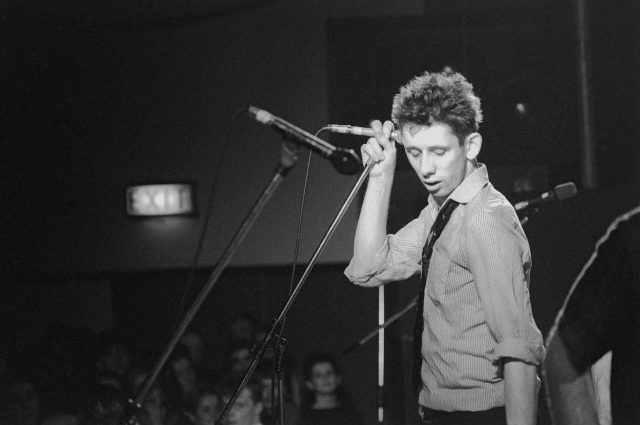Crock of Gold: Belly Full, Spirit Free, by David Bax

It’s all too easy to imagine the type of person for whom the words “Johnny Depp Presents…” would be a selling point. They’re probably the same type of person who would eat up a fawning documentary about Shane MacGowen, a portrait of the kind of sardonic career lush Depp himself so desperately tries to be. But, even with the actor and unfortunate producer muscling his way in front of the camera on occasion, Julien Temple’s Crock of Gold is about a man who is so much more than a heroic drinker. In fact, it’s about so much more than just that man.
Temple, a prolific filmmaker probably best known for two movies about the Sex Pistols (1980’s The Great Rock ‘n’ Roll Swindle and 2000’s The Filth and the Fury), takes on the life, work and legacy of MacGowan, the founder and frontman of The Pogues. Through interviews with MacGowan, his family, fellow musicians like Primal Scream’s Bobby Gillespie and even former Sinn Féin president Gerry Adams, Crock of Gold puts together a seemingly complete life story (and takes well over two hours to do it).
Any Pogues superfan ought to be warned that Crock of Gold is a documentary about MacGowan, not about his band. Other than some snippets of songs (as is usually the case with musician documentaries, full performances would have been more revealing), The Pogues don’t actually appear in the story until after the halfway point. But MacGowan’s stories of his childhood–blissful summers in Ireland with his family, miserable school days amongst the hated English–are a delight all on their own, even through the subtitles required by MacGowan’s heavily slurred speech, punctuated occasionally by a mischievous laugh that sounds like a death rattle.
If MacGowan is known for anything more than being a prodigiously talented songwriter and lyricist, it’s for being a drunk. From his first drink at either four or six years old (Temple cheekily leaves in both versions) to the ones he inadvisably continues to consume to this day despite failing health, drunkenness has always been a celebrated part of his persona and his lyrics (“When the world is too dark/And I need the light inside of me/I’ll walk into a bar/And drink fifteen pints of beer”). Temple appears to embrace MacGowan’s spirited lifestyle, as nearly every interviewee is seen holding a drink.
Fun as it may be to hear stories of pig farming and poitín swilling, most biographical documentaries run out of steam when they don’t have an interest in what their subject represents to the world at large, not just their acolytes. The key that unlocks Crock of Gold‘s grander ambitions comes when one interviewee observes, “The Pogues could never have happened in Ireland.” By combining traditional folk music with the early 1980s London punk scene, MacGowan stamped out an ethnographic portrait of what he calls “the Irish diaspora in London.” And with so many songs set in America (“Fairytale of New York,” “The Body of an American”) or on the perilous journey there taken by so many during the Great Hunger (“Thousands Are Sailing”), the reach extends across the Atlantic until Crock of Gold becomes a picture of MacGowan as the caretaker of Irish identity outside of Ireland. Even his drinking is thus re-contextualized as a reclamation of the uncouth “Paddy” stereotype used to marginalize him in his school days.
It’s clear that this legacy is not taken lightly by MacGowan, even as so many continue to push the romantic myth of him as a magnificent, drunken poet. With his doughy body slumped in a wheelchair and his pallid face drooping to one side, there’s nothing romantic about the very clear ravages of alcoholism on display in Crock of Gold. He doesn’t regret his drinking, probably to his own detriment, but he’s no fatalist muttering bons mots from the bottom of a whiskey bottle either. He’s most alive when we see him performing, alongside Nick Cave, at his own 60th birthday celebration, gripping a microphone in one hand and a glass in the other, adhering to his mission for as long as he still draws breath.




























